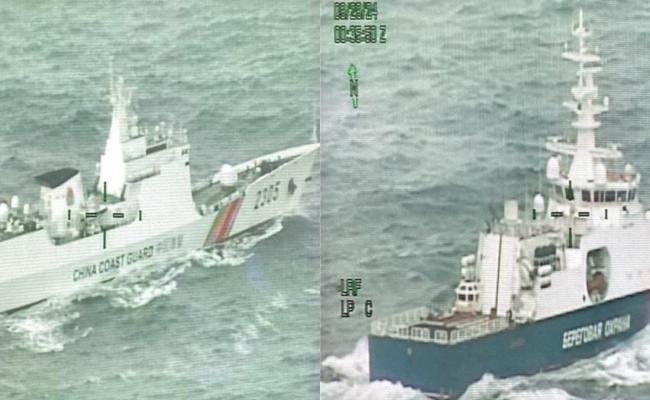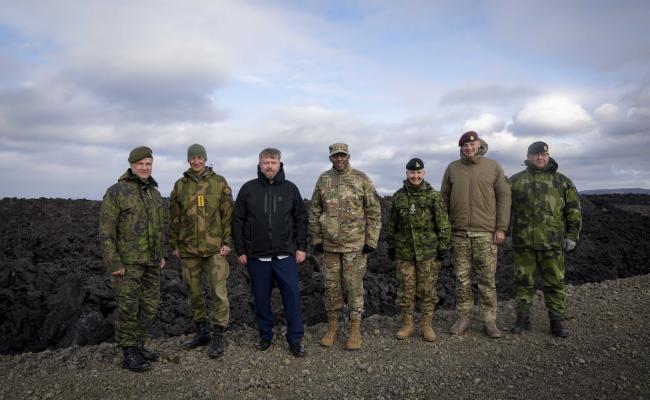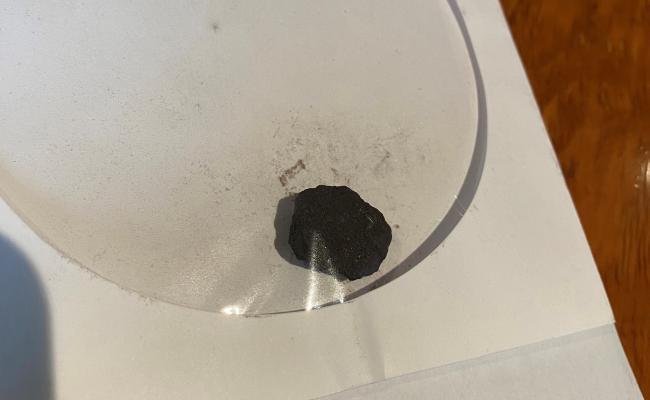The Arctic Circle Assembly 2024 "China's Intentions in The Arctic Are Unclear - And That is a Growing Concern"
Admiral Rob Bauer (Royal Netherlands Navy) is the 33rd Chair of the Military Committee of the North Atlantic Treaty Organization (NATO). As the Military Adviser to the Secretary General and the North Atlantic Council, Bauer is NATO’s most senior military officer. (Photo: Trine Jonassen)
Reykjavik (High North News): “When I first attended the Arctic Circle Assembly conference, the tone and content were different than now. The focus on security in the Arctic has become much stronger", says Admiral Rob Bauer, head of NATO's military committee. Now he warns about China's unclear, two-faced and increasing activity in the Arctic and the worrying Sino-Russian ties.
As Chair of the NATO Military Committee since June 2021, military advisor to the NATO Secretary General and the North Atlantic Council (NATO's principal political decision-making body), Admiral Robert Bauer (61) is the alliance's top military authority.
At least until January, when he retires after 44 years of service.
For the third executive year, Robert Bauer - or Rob - was invited to the Arctic Circle Assembly in Reykjavik, Iceland, to share the latest insights on NATO in the Arctic.
Butting heads
Bauer is not known to hold back, as at the 2022 edition of the conference when he very publicly butted heads with the Chinese ambassador to Iceland, He Rulong, who objected to Bauer's suspicions about China's increased presence in the Arctic.
“Two years ago, the Chinese ambassador to Iceland accused me of paranoia and arrogance when I predicted at this conference that China would enter the Arctic Ocean. And as it turns out, unfortunately, it was an accurate prediction,” Bauer says from the stage.
My message remains unchanged
"He hasn't spoken up since. It's fascinating", Bauer comments as he sits back with a cup of coffee after the speech and Q&A.
A clear military aspect
Rob Bauer hasn't softened to China since then. In fact, he is not happy with being right in his predictions.
“My message remains unchanged. There is increased cooperation between Russia and China in this region that has a clear military aspect to it”, Bauer says.
Chinas actions speak for themselves.
In early October, China's coast guard vessels entered the Arctic Ocean for the first time patrolling the waters with Russian ships.
‘Expect the unexpected’ is for NATO admiral Rob Bauer a personal mantra. In October he stood on the Arctic Circle Assembly stage for the last time as an alliance officer. (Photo: Trine Jonassen)
Just last month, China joined Russia in the Ocean 24 exercise across the Arctic Oceans.
More Sino-Russian cooperation
"This Sino-Russian mission underlines the growing and worrying cooperation between Beijing and Moscow also in the Arctic", says Admiral Bauer.
Russia is also increasingly cooperating with China on minerals and shipping routes, which could affect stability in the region.
And in June, Russia's state nuclear agency Rosatom and China's NewNew shipping announced a partnership to establish a year-round container shipping line along the Northern Sea route.
Unclear intentions
The North Atlantic Treaty Organization sees China as a growing challenge as China's defense grows in the number of capabilities in general, but also in the Arctic.
Also read (The Article Continues)
"It's not clear what China's intentions are. They're not transparent about it," Bauer says with a frown as to emphasize the concern.
He adjusts his already perfectly stiff cuffs, which shine white against the black and heavily decorated Dutch navy uniform. The bright blue NATO badge hangs close to the admiral's heart.
"China talks about itself as a near-Arctic state, which is fascinating. You need quite a lot of imagination to say you're near the Arctic if you're China. But that's what they call themselves," comments Bauer.
Fast growing military
For a long time, China was only scientifically interested in the Arctic. The military aspect is something new.
"We don't understand why they are in the Arctic. If you don't understand why a nation with a growing military — and China's military is growing rapidly, including nuclear weapons — is here, that's worrisome. It is also not entirely clear why they grow so quickly. So that worries the alliance."
Conflicts in one region have global consequences
You say you don't know why China has increased its presence in the Arctic. What exactly are your concerns?
"Conflicts in one region have global consequences. That is why the conflict in Ukraine draws attention in nations such as New Zealand, Australia, Japan, South Korea. They understand that what is happening in Ukraine with Russia can happen anywhere. The violation of a sovereign state and internationally recognized borders can also happen in their region, and they are very concerned about the capabilities and the increasing aggressiveness of China, says Rob Bauer, leaning forward.
"Look at what China is doing to the Philippines. China's behavior is not reassuring. There are more and more nations concerned about what China is doing, such as harassing ships in the South China Sea
All the right answers
When put on the spot, China has the perfect answers.
"China is saying the right things, that they will abide to international rules and respect sovereignty. But if you look at their behavior, there are several examples of them not living up to those rules. China is growing in space and becoming more assertive. So even if we are not physically close to each other, there are serious concerns about what the Chinese are doing, why they are doing it, and if the waterways open up in the Arctic and China operates more in the Arctic with Russia, that means they are physically getting much closer to us. And their ability to reach us relatively quickly through the Arctic is then a possibility."
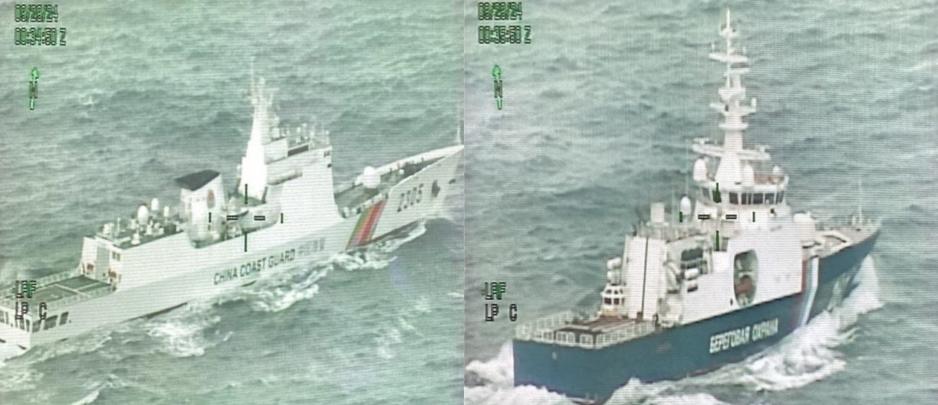
A US Coast Guard long-range surveillance aircraft photographed the Chinese Coast Guard vessels and the Russian Border Guard vessels southwest of St. Lawrence Island in the Bering Sea on September 28th. The Bering Sea is the northernmost part of the Pacific Ocean and is connected to the Arctic Ocean at the Bering Strait. (Photo: US Coast Guard)
Conflict over recourses
The NATO officer also takes into account climate change and ice-free Arctic waters. If this happens, resources may become more accessible, such as moving fish stocks, oil, gas and minerals.
Are we talking war on recourses?
"It is doubtful that Russia will allow us to sail through their sea route. But if it is an international passage, Russia cannot control it in the same way as their territorial waters. If they allow China but not the rest of the world, it creates tensions due to lost equal opportunities."
He makes it clear that China is not a threat, it is a concern. Russia, for its part, is categorized as a clear threat.
NATO knew
If only a few saw the invasion of Ukraine coming, the defense alliance will make sure that no one will be unprepared going forward.
Also read (the article continues)
Since the war, the NATO members have ramped up its defense spendings and welcomed Sweden and Finland to the alliance.
NATO were not surprised by the attack, as they observed the Russian military build-up at the Ukrainian border before 24 February 2022. And they knew within a window of three hours when the attack was going to happen.
Responded swiftly
“A number of nations could not believe that Putin was going to attack Ukraine. But a majority of the allies expected the invasion to happen", says Bauer, recalling the alliance's quick response on the fatal night.
"NATO responded to the attack within an hour, and by then we had an agreement on how to react. 40,000 troops came under the Supreme Allied Commander Europe (SACEUR).
Like a wolf raising its bristles to scare off an intruder, NATO had hundreds of planes and ships out in no time.
No one can afford to be surprised again
“We were able to show Putin that he should not attack us. And Russia has not attacked NATO in the last 75 years, so deterrence works. And that's what the alliance is all about, to make sure we keep our citizens safe. Preferably without fighting, but if necessary we will", says the alliance officer, lowering his voice.
“No one can afford to be surprised again.”
Prepare for reality
What has changed since the invasion of Ukraine?
"The change we have seen in NATO in the last couple of years is the realization that it is not enough to talk about it. The big change after February 24, 2022 is that many people saw the world as they wanted it to be. And for the first time in decades, people understood that that's not how it works. You cannot plan for the world you dream of. You have to respond to reality.”
The reality today is that Nordic allies invest deeply in their capabilities and equipment. This means that jets and ships can better patrol the skies and seas in the Arctic.
Admiral Rob Bauer, Chair of the Military Committee of the North Atlantic Treaty Organization was welcomed by Ólafur Ragnar Grímsson, chair of the Arctic Circle Assembly, for the third and final time. (Photo: Trine Jonassen)
Perfect timing
This week, during the NATO defense ministers' meeting in Brussels, 13 allies launched the North Link initiative. Four weeks ago, the chiefs of defense in Denmark, Finland, Iceland, Norway and Sweden signed the Nordic defense concept.
According to the admiral, this could not have come at a better time as Russia continues to ramp up its military presence in the Arctic:
"Which is home to the Northern Fleet's nuclear submarines, missile facilities, airfields, radar stations and troops. Russia's largest force is stationed on the Kola Peninsula, which shares a border with Norway and Finland."
Critical undersea infrastructures
There is also a new Critical Undersea Infrastructure Coordination Cell (CUI) at NATO headquarters in Brussel in place. Bauer explains that this is not a NATO command, but works through coordination and cooperation with the private sector.
NATO have also established a Maritime Centre for Security of Critical Undersea Infrastructure within NATO’s Maritime Command (MARCOM) in Northwood, UK.
The center is dedicated to the security of thousands of miles of undersea energy pipelines and cables, which are vulnerable to attacks aimed at disrupting energy supply, global communications and economic activity.
Also read (the article continues)
“We will get a better overview of the activities that are ongoing. If you know what the norm is, you spot deviations when there is a different pattern.”
Not automatically an act of war
Does NATO's involvement mean that damage to underwater infrastructure can be seen as an act of war?
“Not automatically. For that to happen, you need to understand who did it. Attribution is important, and not easy. If it is a nation, you must be able to prove it. Is it an accident or on purpose? All these things are important before you declare war.”
So is Russia really a threat to the Nordic countries?
In September, Russian Foreign Minister Sergei Lavrov said that Russia is fully ready to defend its interests in the Arctic region.
The Arctic is not the territory of the North Atlantic alliance
The minister said that NATO is increasingly interested in the Arctic region, "claiming that the North Atlantic Alliance also has its own interests there, due to the geographical location."
Lavrov acknowledges that Norway – as a founding member of NATO – must keep an eye on the region.
"However, the Arctic is not the territory of the North Atlantic alliance."
Bauer's response is that NATO will also defend its interest in this region.
It is a tit for tat game of strength and deterrence.
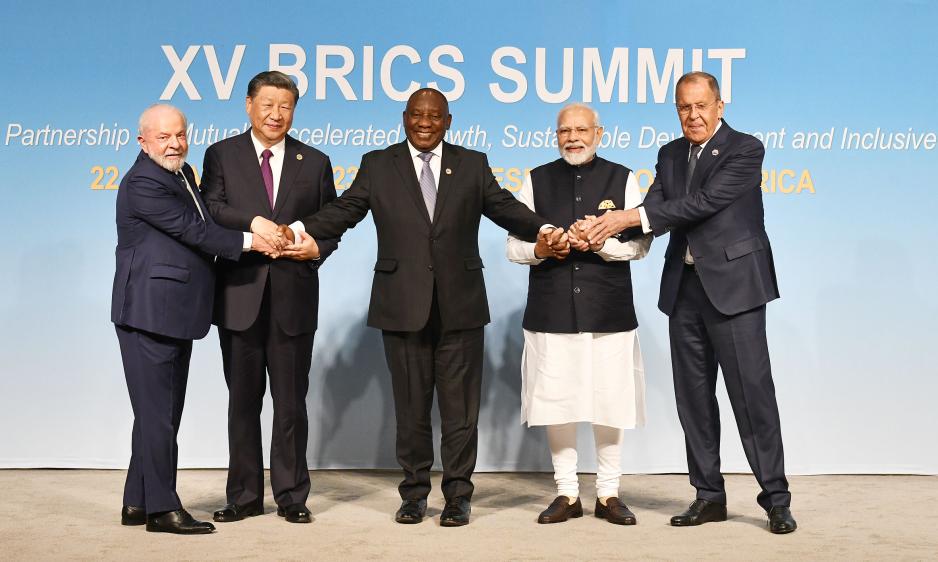
Russia, here represented by MFA Sergei Lavrov, reaching out a hand to the BRICS countries for cooperation within a number of spheres and parts of the world – not least in the Arctic. Here, Lavrov attends the BRICS summit in South Africa last Wednesday with the cooperation format's state leaders: (from the left) Brazil's President Lula da Silva, China's President Xi Jinping, South Africa's President Cyril Ramaphosa, and India's Prime Minister Narendra Modi. (Photo: CGIS)
Numerous military exercises
Over the past few years, the defense alliance has practiced extensively in the Arctic.
Admiral Bauer mentions the doubled number of ships patrolling the North and the Baltic Sea, increased intelligence sharing and a range of protective military activities carried out through the Joint Expeditionary Force.
"Canada and the Nordic countries plan to create a new Arctic security dialogue to coordinate defence, intelligence and cyber threats."
And the United States, Canada and Finland have announced their intention to build new polar icebreakers through the Icebreaker Collaboration Effort, commonly referred to as the ICE Pact.
Finally, the Pentagon has updated its Arctic strategy, focusing on exercising American presence in the region and training with allies and partners.
Also read (the article continues)
However, Rob Bauer emphasizes that NATO does not want war with Russia.
"But because they are the biggest threat, we have made all our plans based on those threats and to be ready."
War or no war?
The question everybody who lives in the High North wants to know is, should we worry about an attack from Russia?
"Putin says it's ridiculous that he would attack NATO. So why is NATO so worried? Well, he also said he wouldn't attack Ukraine, and he did. He said he wouldn't attack Crimea, and he did. He said he would not attack Georgia. And he did. What Putin says and what he does are two different things."
Bauer pauses. The admiral does not come across as a man who gesture much, but now he raises his hands as to make a visually clear point.
Putin has shown us many times what he is willing to do
"We know through a treaty text that we received at NATO headquarters in December 2021 that Russian ambitions are much greater than Ukraine. Putin basically wants to return to the 1997 borders in terms of spheres of influence, which would mean that all the nations that have since joined the alliance - the Baltic states, Poland, Slovakia, Hungary, Romania, Bulgaria - would be second-ranked NATO members, and we would not be allowed to have foreign troops in these countries. We would only be able to train there once a year with a brigade for two weeks with other forces.”
He leans back and rests his hands on the armrests of the chair.
"Of course we have said that it is not going to happen because these nations are members of NATO and they have the same rights as all other nations. But that is what Putin wants. It is not a theory. No, we are not at war, but Russia is our biggest threat and you should believe this because Putin has shown us many times what he is willing to do.”
“Further talks with Russia will serve no purpose. Putin only understands power and strength.”
Nuclear saber-rattling
The Russian president has resorted to a pattern of nuclear saber-rattling that is of Western concern. But how do we know when it’s the real thing?
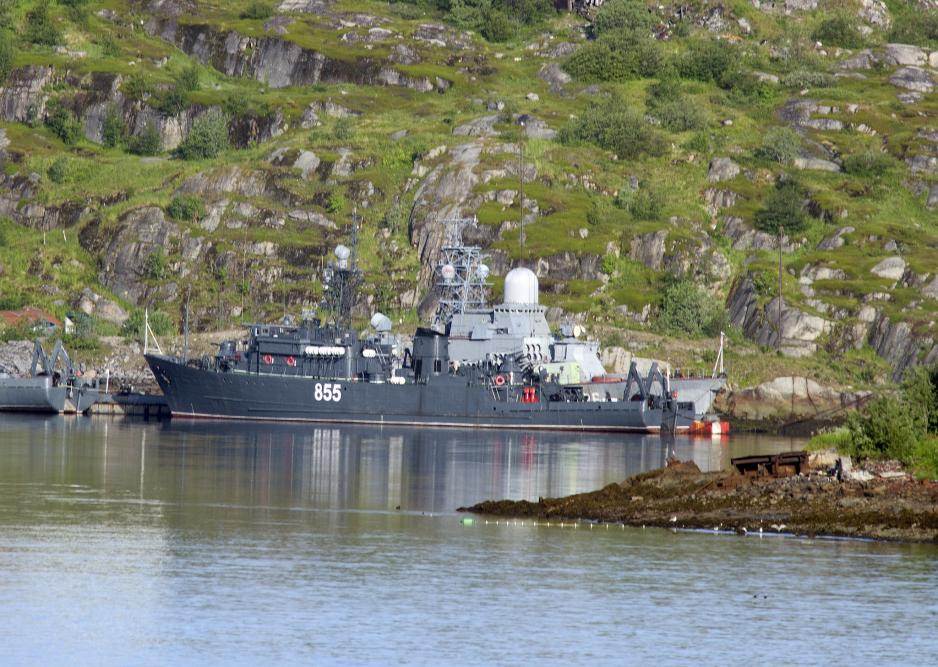
Vessels from the Russian Northern Fleet on the Kola Peninsula. (Photo: Christopher Michel/Flickr)
In the July 2024 Washington Summit Declaration, NATO declared that as long as nuclear weapons exist, NATO will remain a nuclear alliance.
“That means you have to be willing to use it if necessary. But it is a weapon of last resort because we have agreed with Russia and China that the nuclear war will never be fought. And will never be won. That's the problem. If that taboo is broken by someone, we have a serious problem as a planet.”
New nuclear doctrine
Recently, Russia changed its nuclear doctrine "in response to Western intervention in the escalating war in Ukraine," as Russian Deputy Foreign Minister Sergey Ryabkov said in September.
“The Russian doctrine covers the use of tactical nuclear weapons, and they talk about it almost every week now. If you repeatedly threaten to use nuclear weapons and you don't do it, it loses power after week four, and maybe sooner. The problem with nuclear weapons, though, is that when they hit, it's pretty bad. So we have to take this very, very seriously", says a serious Bauer, before loosening the mood:
"But the good news so far is that it's rhetoric and we haven't seen anything that forces us to change our nuclear power strategy."
Also read (the article continues)
Tough choices
As mentioned, Admiral Bauer does not hold back. And the clearly spoken Dutch officer also has a clear message for the European population, which has the potential to set back the work on climate.
The question of a self-sufficient Europe, free from dependence on China's minerals.
That means some tough choices have to be made.
China largely controls the mineral resources we need for energy and the green shift. But what happens if these resources become unavailable to Europe?
"We all want to save the planet, and I'm not being cynical about this. We all want to get rid of fossil fuels. But nobody dares to go for nuclear energy, which I think we should discuss, but ok. There are renewable energies like wind, water and solar power. However, 95 percent of the rare earth materials and components we need for renewable energy are in the hands of China," explains Bauer.
Then we are seriously fu... Yes
From the stage, he points to the dependence on Russian gas and what happened when the economic sanctions kicked in after the war.
"Then we had a serious problem. We thought we had a contract with the Russian state-owned gas company Gazprom. But we didn't. We had a contract with Putin. So if we think we have a contract with Chinese companies, we are naive. Because when we have changed our energy sources to renewable energy in five to seven years because we want to save the planet…"
Bauer looks at the crowd inside Harpa's concert hall who are almost sitting on top of each other to hear the admiral's speech.
"Then we are seriously fu... Yes."
And the crowd goes wild. Well, as wild as a crowd of mostly well-dressed and well-behaved politicians, scientists and economists can go.
Managing Director Størker Bjørnstad at Sulitjelma mining in northern Norway has worked since 2011, to start up new operations at the historic mining site. (Photo: Hilde-Gunn Bye).
After the applause and laughter die down, Robert Bauer offers a solution to the dilemma he just painted. Although it may not be popular.
"Rare earth materials are not necessarily that rare. They are found, for example, in nations such as Canada, Sweden, Finland and Norway. We could mine them ourselves, but then we will ruin the planet. We must understand the consequences of this discussion. I am not saying that this is the best option, but if we are completely dependent on China, it is not good. And we can become less dependent on China because we have these minerals in our part of the world. But to do that, we have to accept that it has a consequence for the climate.
"So it is difficult."
Does he US election matter?
Let's talk about the upcoming US election in just two weeks. Ex-president Donald Trump's threats against NATO members that are not pulling their own weight are widely known. How is NATO preparing for the outcome?
"We don't," states Bauer, then offers an extended explanation;
“If we have to prepare for every election in 32 nations … There are at least eight nations on average holding elections at any given time. Sometimes with serious outcomes that can affect agreed policies. That is how it is. We are 32 sovereign states and there will be differences and disagreements. But for 75 years, we have overcome these differences time and time again, on important issues such as collective defense and our security.”
Also read (the article continues)
He explains that Trump is not necessarily against NATO.
“He was angry about nations not spending enough money on their own security, on their ability to defend themselves, which is Article 3. If all members can defend themselves, it's much easier to help someone else. For decades, many nations have neglected this duty, believing that the United States would save them.”
Did what he asked
Now it is a different situation.
“We have changed dramatically from 3 to 4 nations to 23, which spend at least two percent of GDP (gross domestic product) on defense. So if Trump wins, we can tell him that most of the nations did what you rightfully asked for, and we're in a completely different situation than when he was first president.”
Admiral Rob Bauer ensures that leaving NATO is not a presidential decree.
Last year, the US Congress approved a legislation that prevents any president from withdrawing the US from NATO without Senate approval or an act of Congress.
The Congress states that any president "shall not suspend, terminate, condemn, or withdraw the United States from the North Atlantic Treaty without either a supermajority vote of the Senate, or an act passed by the full Congress."
"It is in the US's interest to have a stable, secure and free Europe. Of course, Europe must be able to do more with deterrence and defense and invest in capabilities that currently only the United States has, says admiral Robert Bauer.
If he returns to the Arctic Circle Assembly in Iceland next year, it will be as a civilian. But the soon-to-be-retired admiral sure knows how to go out with a bang.


